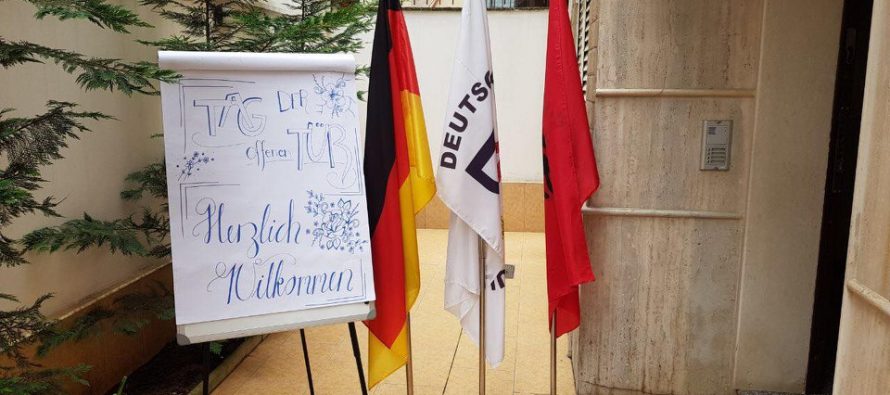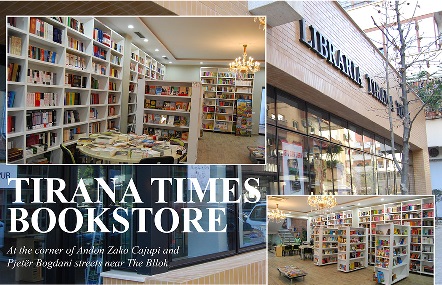German values and education hand in hand at DAS

Related Articles
It was Halloween when my colleague and I entered the Deutsch-Albanische Schule (DAS) down the Nikolla Nishku street in Tirana. As we entered the three-story building, we were flooded by the laughter and callings of the pupils playing in the gymnasium. The children were dressed in colorful costumes, as the tradition requests. Little fairies, princesses and princes, superheroes and even grim reapers were playing together in games designed to bond a stronger friendship.
The German-Albanian school is a mid-school consisting of six grades, which was established as a necessity to meet the demands of the parents whose children went to the German kindergarten Topolino. The education received in the kindergarten is German and so is the language spoken and taught there by the caretakers. The parents thus wanted their children to continue their studies in the discipline.
In addition, the school is also open to the children of embassy employees and other German citizens living in Albania, the returning emigrants from German-speaking countries, and the children whose family members live in any of those nations or are preparing to leave.
Thus, more than a business model, this school only serves the purposes of an educative institution in a foreign curriculum, to meet the requests of a very much demanded didactic model.
All 60 pupils of this school learn an exclusive German curriculum from German and Albanian teachers. All the subjects are taught in German - sports, math, science, geography. The Albanian pupils also attend Albanian language and history classes, as the law requires, whereas the foreign students have preferential choices over Albanian or English as a foreign language.
Walking through the classes one notices decorations on the walls, posters around the board, a map of Germany, the alphabet, neat desks with books. There are also the pictures of the pupils on a small board that marks their progress. Those who might score poorer usually take extra lessons and are paid more attention by their teachers, so they can succeed as much as their peers.
The newcomer pupils who don’t speak German at all, or very well, are put in the same classes with their peers and abide to the same timetable as their group. However, they take intensive language classes and an additional math class in Albanian, so their language skills can better. Yet, as Headmistress Rina Kazazi expresses, even though the parents might claim the language is hard, ‘’the children really are like sponges, they learn really fast.’’
But this doesn’t only come from the ability of the students to learn fast. It is also the teachers who make it easier for them by creating more interactive classes through games and contemporary techniques. Even though mostly younger than 30, the teachers are already experienced in their fields, and the German teachers have already taught in public schools back in their home country.
Teacher Christopher Butsch started teaching on Sept. 2018 at DAS. He has previously taught at public German schools, so he brings some first-hand experience from the German education system. He teaches various subjects in all classes. Kazazi says that he focuses 100 percent on the children and he constantly tries to figure out creative ways to make the classes easier for the Albanian pupils.
‘’From 8 a.m. until 2 p.m. when the classes end, he is 100 percent with the pupils, not 50 nor 80 percent, but 100. This is a big difference, as we come from a system where teachers in Albanian schools except the 45 minutes with the students in class, she’s is gone,’’ said Kazazi, trying to draw a distinction of the difference between the education pattern in the school she governs and the public ones. Yet, her point being that the teachers should try to pay more attention to the students needs.
Butsch loves his job and seeks to raise happy kids, that’s why he shows up everyday. He admits that although it isn’t the easiest job in the world, there is always one magic moment of the day that proves to you you’re doing it right.
‘’We have this new kid, his name is Enkli, and when he came here he didn’t speak a word in German at all, so he couldn’t understand me. Today, I was trying to teach him the German expression for bon appetit, which is guten appetit. And this afternoon we were sitting together for lunch, and we started our meal, and he was like ‘hey Butsch, guten appetit’. And this is the moment when you know that you are doing something good, and be part of the education,’’ said Butsch, sharing a short occurrence with one of his pupils during lunch.
There are differences from German kids and Albanian ones that Butsch draws attention to. First, the Albanian kids have much more energy than kids in Germany, and secondly, the kindergarten system is much more different there. The German teachers have had a hard time trying to get the kids to pay attention. Even though this is a pattern that every teacher teaching first grade faces, perhaps the discipline the German kids receive in kindergartens has a lot to do with their calm characters. Another difference the school’s coordinator Robert Ludtke has noticed, is that no kid here wants to return to school after summer vacations.
‘’The summer vacations in Germany are six weeks, so it is easier for those children to return to their routines. Whereas here it is three months and they go to the mountains, to the beaches, and they don’t want to come back,’’ said Ludtke.
Yet, there is something astonishing they all notice from the kids play and how they interact without the necessity of using a language.
What else is different?
The school was initiated by current executive director Orieta Jazxhi with the informal help of ex-German ambassador Helmut Hofmann and his wife. The licence was given in May 2016 with a government decision allowing a German curriculum to function, and the teaching method to be made solely based on the German education system. The school was opened in Sept. 2016 with only 20 students and has since grown into 60 pupils and six classes.
There has been a high demand from parents to register their children in the school, but the current building’s space does not allow a higher number of students. Ludtke said however, that on Sept. 2019 they are moving into a another bigger building and taking in more students.
There is the question of the new trend of Albanians emigrating towards Germany, and whether this high demand to register their children to the school meets this purpose.
‘’From a survey we’ve conducted with the parents, they have explicitly said they want their kids to receive a German education. They like their discipline, the habits, punctuality,’’ said Jazxhi.
When moving into a new building the school will also extend to higher classes, as the licence allows a high-school program. All the books used are the same ones used in German schools. Half of the pedagogical staff is German, and kids are encouraged to finish their homework at school if they have time. However, not all kids show the right motivation to complete this task indoors, but no pupil shows up unprepared.
Clubs are an additional part of the schooling program which seeks to engage kids in various extracurricular disciplines to develop their skills and language. Coordinator Ludtke is the one responsible for the clubs and organizing various events. He inspects their progress and does the planning, however, each of the German professors has their own club accounted for to teach the kids.
Cooking club, theatre, environmental club, arts and painting clubs. They organize various activities, as staging theatre plays in German, learning musical instruments, cooking together. The environmental club for instance takes its members on a tour around the neighborhood to clean the garbage from the ground.
Thus, there aren’t only the values of discipline or strong educational system with well-prepared students, but the staff seeks to raise conscientious individuals and citizens as well, that can easily communicate with others, hold various skills, and respect the habitat around them.




